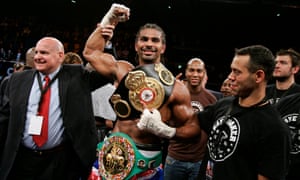Nearly eight years after he vowed to retire on his 31st birthday, David Haye was adamant on Tuesday that he is walking away from boxing for good. Revealing for the first time details of long and painful back surgery that curtailed the latter part of his career, he said: “I have given my heart and soul to boxing for 27 years.”
And no sooner had the transatlantic shouting match between Anthony Joshua and Deontay Wilder descended into another strident and pointless exchange than Haye stole everyone’s thunder – although it was hardly a surprise, given the way Tony Bellew battered him to defeat in the fifth round of their rematch at the O2 Arena in London last month. It was a brave, doomed farewell for the former world cruiserweight and heavyweight champion who, at his best, was among the most exciting fighters in the world.
He strongly suspected before the fight that the future belonged to Joshua, Bellew, Wilder and a hunting pack of young and not-so-young contenders – such as Tyson Fury – who are too strong and fresh for him, but he was determined to find out for himself the only way he knows how: in the ring.
Joshua and Wilder are now locked in a ping-pong match of offer and counter-offer, although the odds are their unification fight will take place in the UK this year, probably after the British multi-belt champion makes a mandatory defence against Alexander Povetkin.
Shelly Finkel, the American’s co-manager, told ESPN: “Deontay has accepted his terms to fight in the UK. Deontay sent an email to Joshua [Sunday] night, and I sent one [Monday] to Barry Hearn and Eddie telling them that we officially accept the offer to fight under the terms they gave us and to send us the contract.”
Eddie Hearn responded by saying: “It’s great that he’s come back to us. We made this offer about four weeks ago and I don’t know if he’s come back because he’s heard we’re close to closing the Povetkin fight or whether he wants the fight. But, either way, he’s going to be getting a contract from us asap.”
It is the sort of exchange Haye was adept at throughout a 32-fight career that began in 2002 and which delivered some great nights – winning the cruiserweight title from Jean-Marc Mormeck in Paris in 2007 – and less memorable evenings, such as his 12-round survival exercise against Wladimir Klitschko in 2011, after which he attracted universal ridicule for blaming his poor performance on a sore toe.
The latter part of his career will be remembered for serial cancellations because of injury, particularly ahead of aborted bouts with Fury. But he lit up British boxing like few other big men, an uncompromising knockout artist who stopped 26 of his opponents, while failing to get to the final bell three times himself.

In a long and detailed statement, Haye said: “Thanks to boxing, I have been able to live my unencumbered childhood dream, a dream my dad, Deron, facilitated the moment he took me to Fitzroy Lodge amateur boxing club as a nervous 10-year-old.”
He added: “In the first eight years [of his professional career], everything ran smoothly. I had 25 fights and became the first British boxer to unify the cruiserweight division. I then achieved my childhood dream when I beat the WBA champion Nikolay Valuev, the seven-foot-two, 150-kilogram ‘Beast from the East’.”
He also revealed for the first time the full extent of his physical struggle in recent years. “If I had it my way, I would have fought as many as 16 times in the last eight years. But, unfortunately, my faulty body only allowed me to step through the ropes on seven occasions for four wins, three losses. Often it was a fight just getting to the ring in one piece.
“In the past five years I have snapped both biceps, my rotator cuff and my Achilles tendon. All four injuries were potentially career‑ending and each of them required operations with months of intense rehabilitation.
“The biggest physical challenge I had to face, however, was spinal surgery in March 2015. I herniated a disc in my lower back 10 years ago and years of intense training wore this disc away. This caused fragments of disc to push into my spinal nerve passage, resulting in chronic pain and loss of function in both legs. An operation was required to put a two-centimetre metal cage between two vertebrae and implant two metal rods with screws and bone grafts to fuse it all together.
“This was one battle I had to fight in private, and it’s only because the process was recorded for a documentary that people will one day be able to grasp the severity of the situation.”
With The Hayemaker, there is always a deal around the corner. He is a promoter now and will no doubt bring his special brand of hype to the business – and, given the details of his injury problems, will not be tempted for one last big night in the ring, whatever the money.